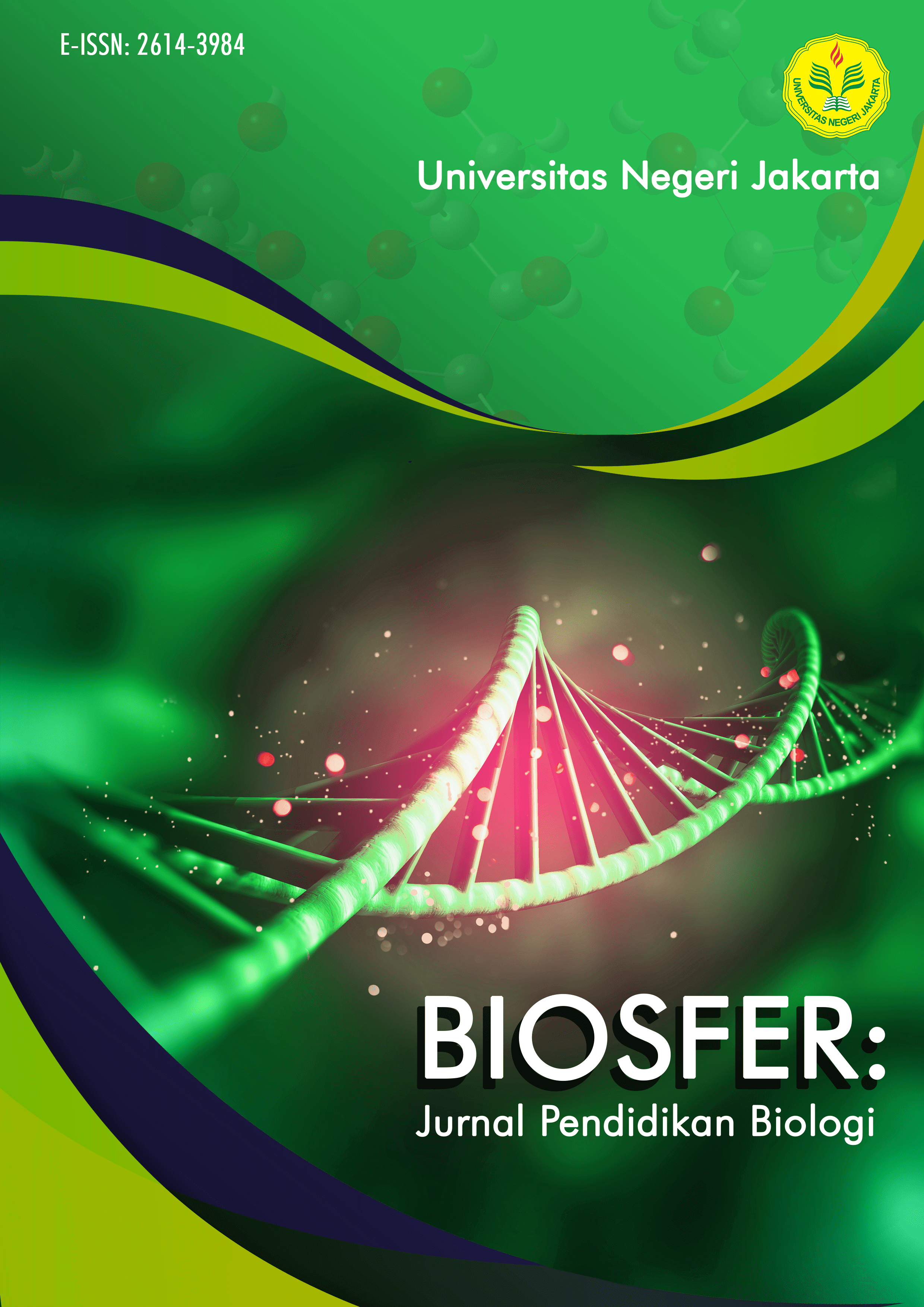Does STEM-project based learning improve students' literacy as scientific competencies?
DOI:
https://doi.org/10.21009/biosferjpb.20354Keywords:
Competency science, Project-Based Learning, Science literacy, STEMAbstract
Twenty-first-century skills impact educational reform centered on science, technology, engineering, and mathematics (STEM). Middle schools specifically apply STEM to improve students' science skills. Several literature studies show the success of STEM in improving student competence. The effect of STEM-PjBL on the science competencies of grade X students will be specifically explored in this study. The sample consisted of 60 high school students divided into an experimental class (n=30) and a control class (n=30). The posttest-only control group design was adopted in this study. STEM-PjBL learning with reproductive system material was implemented in the experimental class (n = 30) for two weeks, and lecture model learning was implemented in the control class. A total of 60 randomly selected high school students were involved in this study. Quantitative data were processed using Microsoft Excel. Hypothesis testing with normality and homogeneity tests was followed by a t-test because the data were normally distributed and homogeneous. This study reveals: (1) The STEM-PjBL model affects student competence. (2) In practical-based materials, the integration of STEM in PBL is proper. (3) Based on the analysis of the STEM-PjBL instrument, the experimental group outperformed the control group on the post-test results. Learning with the systematic STEM-PjBL model has a significant influence on students' science competence.
References
Ariyatun, A., & Octavianelis, D. F. (2020). Pengaruh Model Problem Based Learning Terintegrasi Stem Terhadap Kemampuan Berpikir Kritis Siswa. JEC: Journal of Educational Chemistry, 2(1), 33. https://doi.org/10.21580/jec.2020.2.1.5434
Ashcraft, M. (2002). Math Anxiety: Personal, Educational, and Cognitive Consequences". Directions in Psychological Science. Blackwell Publishing Inc-American Psychological Society. 181-185. https://journals.sagepub.com/home/cdp
Billiark, K., Hubelbank, J., Oliva, T., & Camesano, T. (2014). Teaching STEM by design. Advances in Engineering Education.
Cakiroglu, U., & Erdemir, T. (2018). Online Project-Based Learning Via Cloud Computing: Exploring Roles of Instructor And Students. Interactive Learning Environments. https://doi.org/https://doi.org/10.1080/10494820.2018.1489855
Cindy, E., & Hmelo-Silver. (2019). Problem-Based Learning: What and How Do Students Learn? Educational Psychology Review, 16(3), 235–266.
Docktor, J. L., & Mestre, J. P. (2014). Synthesis of discipline-based education research in physics. Physical Review Special Topics - Physics Education Research, 10(2), 1–58. https://doi.org/10.1103/PhysRevSTPER.10.020119
Eccles, J. S., & Wang, M. Te. (2016). What motivates females and males to pursue careers in mathematics and science? International Journal of Behavioral Development, 40(2), 100–106. https://doi.org/10.1177/0165025415616201
Furi, I. M. L., Sri, H., & Shinta, M. (2018). Eksperimen Model Pembelajaran Project Based Learning dan Project Based Learning Terintegrasi STEM Untuk Meningkatkan Hasil Belajar dan Kretivitas Siswa Pada Kompetensi Dasar Teknologi Pengolahan Susu. Jurnal Penelitian Pendidikan, 32(1).
Gormally, C., Brickman, P., Hallar, B., & Armstrong, N. (2009). Effect of Inquiry-Based Learning on Student's Science Literacy Skills and Confidence. International. Journal for the Scholarship of Teaching and LearninG, 3(2), 1–18.
Latip, A., & Permanasari, A. (2015). Pengembangan Multimedia Pembelajaran Berbasis Literasi Sains untuk Siswa SMP pada Tema Teknologi. Research Artikel Edusains, 7(2).
Maulana, M. (2020). Penerapan Model Project Based Learning Berbasis Stem Pada Pembelajaran Fisika Siapkan Kemandirian Belajar Peserta Didik. Jurnal Teknodik, 2, 39. https://doi.org/10.32550/teknodik.v0i2.678
Miftahuzzakiya. (2018). Pengaruh Pendekatan Pembelajaran Science, Technology, Engineering, Mathematics (STEM) Terhadap Kemampuan Literasi Sains Peserta Didik Pada Konsep Jamur. Universitas Islam Negeri Syarif Hidayatullah Jakarta.
Monroe, M. C., Hall, S., & Li, C. J. (2016). Can Climate Change Enhance Biology Lessons? A Quasi-Experiment. Applied Environmental Education and Communication, 15(2), 125–137. https://doi.org/10.1080/1533015X.2016.1164095
Muharomah, R, D. (2018). Pengaruh Pembelajaran Science, Technology, Engineering, Mathematics (STEM) Terhadap Hasil BelajarPada Konsep Evolusi. Universitas Islam Negeri Syarif Hidayatullah Jakarta.
Mustofa, R. F., Aloysius, D. C., Suarsini, E., & Saptasari, M. (2018). The Correlation between Generic Skills and Metacognitive Skills of Biology Education Students in Tasikmalaya Indonesia Through Problem-Based Learning Model. The Journal of Social Sciences Research, 5(Special Issue 5), 662–667. https://doi.org/10.32861/jssr.spi5.662.667
OECD. (2019). PISA 2018 Results (Volume III): What School Life Means for Students' Lives. OECD Publishing, Paris. https://doi.org/https://doi.org/10.1787/acd78851-en
Organisation for Economic Cooperation and Development, O. (2015). Assessment and Analytical Framework Science, Reading, Mathematics and Financial Literacy.
Permanasari, A. (2016). STEM Education: Inovasi dalam Pembelajaran Sains. Jurnal Dalam Seminar Nasional Pendidikan Sains.
Putri, C. D., Pursitasari*, I. D., & Rubini, B. (2020). Problem Based Learning Terintegrasi STEM Di Era Pandemi Covid-19 Untuk Meningkatkan Keterampilan Berpikir Kritis Siswa. Jurnal IPA & Pembelajaran IPA, 4(2), 193–204. https://doi.org/10.24815/jipi.v4i2.17859
Rachmawati, F. R., & Setyaningsih, D. N. (2014). Implementasi Pendekatan Saintifik dengan Model Pembelajaran Kooperatif Tipe TGT untuk Meningkatkan Kemampuan Berpikir Kritis Siswa. 532–539.
Robinson, J. K. (2013). Project-Based Learning: Improving Student Engagement and Performance in The Laboratory. Anal Bional Chem, 405(7), 13.
Sari, A. N. D., Ani, R., & Murbangun, N. (2017). Pengaruh Pembelajaran Berbasis Proyek terhadap Kemampuan Literasi Sains Siswa. Pancasakti Science Education Journal, 2(2).
Sastrika, I. A. K., Sadia, I. W., & Muderawan, I. W. (2013). Pengaruh Model Pembelajaran Berbasis Proyek terhadap Pemahaman Konsep Kimia dan Keterampilan Berpikir Kritis. E-Journal Program Pascasarjana Universitas Pendidikan Ganesha Program Studi IPA, 3.
Syintia, S., Akbar, B., Safahi, L., & Susilo, S. (2018). Pengaruh Strategi Pembelajaran Relating, Experiencing, Applying, Cooperating, Transferring (REACT) terhadap Keterampilan Proses Sains Siswa. Assimilation: Indonesian Journal of Biology Education, 1(2), 82. https://doi.org/10.17509/aijbe.v1i2.13052
UNEJ. (2019). ICoSTEM-ED2019 JEMBER ICoSTEM-ED2019. Learning Innovation in Science and Technology to Challenge the Future .
Wijayanti, A., & Khusnul, F. (2018). Implementasi Stem Project Based Learning untuk Meningkatkan Keterampilan Kerja Ilmiah Mahasiswa Calon Guru SD. Jurnal Pendidikan Sains (Jps), 6(2).
Downloads
Published
How to Cite
Issue
Section
License
The Authors submitting a manuscript do so on the understanding that if accepted for publication, copyright of the article shall be assigned to Biosfer: Jurnal Pendidikan Biologi (Biosferjpb) and Departement of Biology Education, Universitas Negeri Jakarta as publisher of the journal.



